How To Take Care Of Colored Hair At Home: 17 Expert Tips
Simple aftercare practices to protect and improve the texture and color of your dyed hair
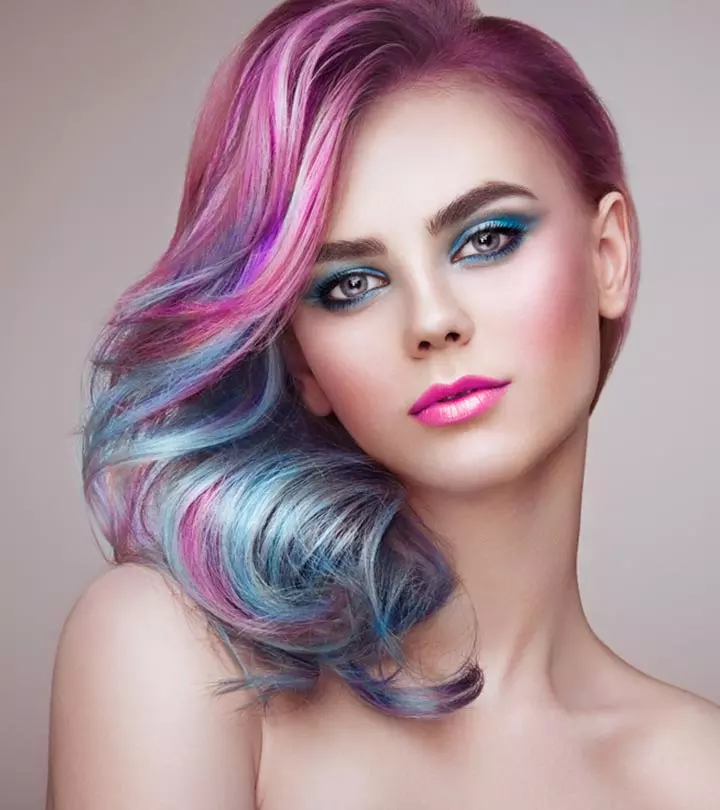
Image: Shutterstock
The salon might be a great place to get your tresses colored, but what about maintaining your exquisitely colored hair? What you need are a few DIY hair color tips to help you maintain your colored hair at home without shelling out much money! Coloring your hair means allowing chemicals to penetrate your locks, leaving them prone to dryness, damage, and breakage. Also, your color-treated hair can easily become lifeless and dull without the right aftercare. All you need is a little devotion, suitable hair color products, and persistence to flaunt your color-treated hair for a long time.
In this article, we have listed easy and simple hair care tips so you can keep your tresses healthy and protected. Keep reading to know more!
In This Article
17 Tips on How To Take Care of Colored Hair at Home
The internet is full of the latest hair color trends, and each trend is better than the next. However, there are very few platforms that talk about hair color maintenance. We are here to share our expert tips with you, which will ensure the longevity of your hair color.
1. Wait For Three Days Before You Wash Freshly Colored Hair
Do not wash your hair for at least 72 hours after the hair color application; otherwise, the color will wash off easily. The chemical processing during hair coloring leaves the hair cuticlesi Smooth, flat outermost layer of hair composed of overlapping shingles that protect the hair. open and prone to damage. Hair dyes chemically alter the hair structure. This hair is more porous and susceptible to damage.
2. Use A Color Protectant Shampoo
The type of shampoo you use plays a major role in keeping your hair color from losing its vibrancy. When you do wash your hair, use a specially formulated shampoo for color-treated hair. It will protect your hair as well as balance its natural pH. Color-safe shampoos maintain your hair color and ensure that it does not fade quickly. They also contain hydrating and nourishing ingredients that restore and repair your hair. Avoid shampoos with harsh ingredients such as sulfatesi Aggressive detergents made of sulfur-containing mineral salts and are found in household cleaners, detergents, and shampoo. and alcohols. They will strip color and moisture from your hair.
3. Shampoo Your Color-Treated Hair Less Frequently
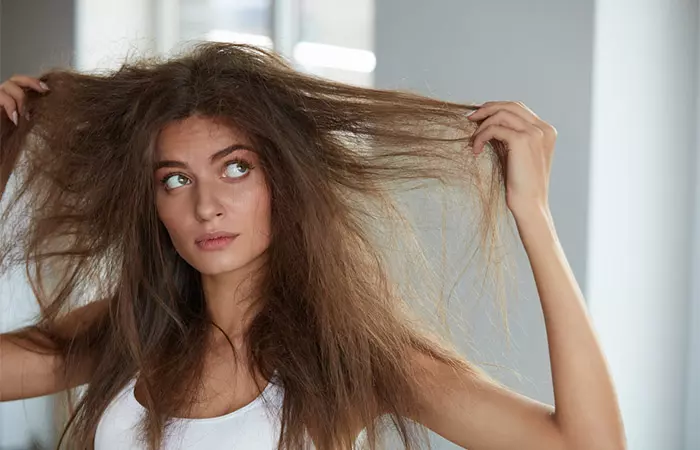
Washing your colored hair often will cause the dye to leach out and the color to fade. Frequent washing also strips your hair of its natural oils, leaving it dry, dull, and lifeless. To prevent this, wash your hair less often. This will keep the hair color looking vibrant too.
 Quick Tip
Quick Tip4. Use Dry Shampoo
You can’t compromise on hygiene, so on days between washes, use a color-safe dry shampoo to soak up the grease, dirt, and product build-up from your hair. This will get rid of the grime and gunk without stripping your hair color due to frequent shampooing.
5. Condition Your Colored Hair
Every time you shampoo your colored-treated hair, you must use a conditioner. Ensure that the conditioner is also color-safe. These conditioners form a protective barrier on the hair strands. This helps in sealing the cuticles and locking in moisture which adds shine, volume, and luster to your hair. Thus, it leaves your hair soft, healthy, and glossy.
Janine Lewis, a blogger, shares how she protects her hair color by using products designed for color-treated hair: “After rinsing out the dye, use the conditioner that comes in the box… it really helps. My hair always feels very brittle after putting the dye on it, and using the conditioner helps it feel strong and healthy again (i).”
6. Limit Exposure To Damp Air
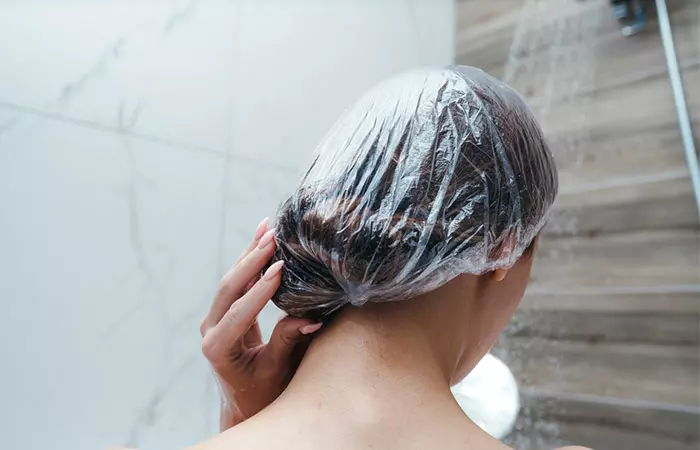
Avoid long showers or humidity as damp air makes hair color fade. Use a shower cap while you bathe, and don’t get your hair wet often. Protect your hair with anti-humidity serums, especially during the rainy seasons.
7. Avoid High Temperatures
Try to opt for cool or lukewarm showers as hot water can damage and fade color-treated hair. This also stands true for heat-styling tools such as curling irons, hair straighteners, and blow dryers. The outer protective covering of the hair is disrupted as the heat opens up the cuticle and the dye bleeds out easily. Use a thermal protectant hair serum or spray whenever you have to style your hair.
 Quick Tip
Quick Tip8. Use Deep Conditioning Treatments To Smoothen And Add Luster To Colored Hair
For extra shine, pamper your color-treated hair locks once a week to a deep-conditioning treatment. Apply the treatment to damp hair and comb it through from roots to tips. Pull your hair into a bun and pin it into place or wrap it up in a soft towel and leave the treatment in your hair for 30 minutes. When you rinse it out, you’ll be left with softer, shinier hair.
Another side effect that comes with coloring your hair is the protein damage your hair goes through (1). You know your hair is in dire need of protein when it starts to stretch and snap off. It might also feel a bit mushy when it is wet. The only way to fix this is by nourishing your hair with protein. You can use store-bought protein treatments or DIY hair masks.
Eggs are packed with proteins that help nourish your hair (2). Anecdotal evidence suggests that mayonnaise tames frizz and smoothens your hair. Thus, regular use of this hair pack may help repair protein damage and restore the health of your hair. Here’s a simple DIY protein mask you can try out.
You Will Need
- 1 egg
- 2 tablespoon mayonnaise
Processing Time
- 45 minutes
Process
- In a bowl, whip a whole egg and two tablespoons of mayonnaise together until you get a smooth mixture.
- Start working the mixture into your hair. Concentrate most on the tips of your hair.
- Once all of your hair is covered, leave the egg-mayo pack on for about 45 minutes.
- Proceed to wash your hair with a mild sulfate-free shampoo and cool water.
- Repeat this once a week.
9. Apply Leave-In Treatments To Protect Color-treated Hair
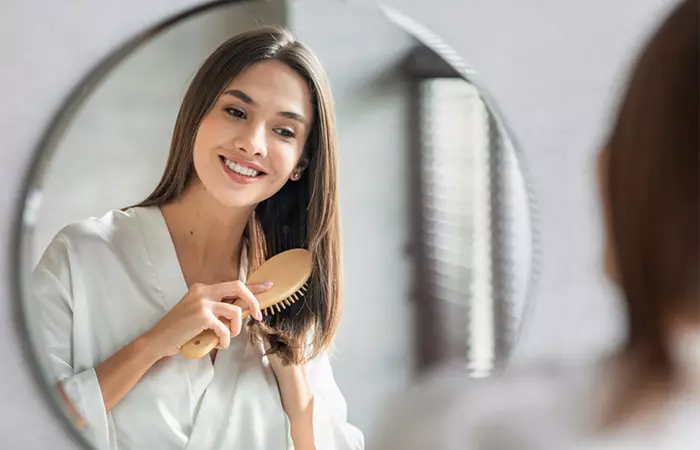
Leave-in conditioners contain silicones that form a protective layer over the hair shafti Visible part of the hair that projects out of the skin, which contains the cuticle, cortex, and medulla. (1). This helps minimize sun damage and calms post-processing frizz. They also help protect your hair from the damage heat styling tools tend to cause. Using a leave-in conditioning treatment can also help detangle your hair and protect it from environmental aggressors. Look for leave-in conditioners that are specially formulated to protect color-treated hair. This is particularly important if you frequently use blowdryers, curling irons, or straightening irons, or if you spend a lot of time near a heater or in the sun.
10. Apply A Hot Oil Treatment To Add Shine To Color-Treated Hair
are simple to do at home and help color-treated hair really shine. Apply the hot oil to clean, towel-dried hair and cover it with a shower cap. Apply heat by using a hot towel, a blowdryer, or even by sitting in the sun. Then, allow your hair to cool down to room temperature before rinsing off the oil with cool water. While hair packs can do a great deal to improve the health of your hair, regular oiling must also be an integral part of your hair care routine (1). Whether it is applying oil to your hair before bed and washing it off in the morning or a brief hot oil treatment, no hair care routine can be complete without oiling.
Oils seal nourishment and moisture in your hair. They also form a protective layer over your hair, which protects it from sun and heat damage (1). Follow the steps below to give yourself a hot oil treatment at home.
You Will Need
- 2-3 tablespoons of carrier oil of your choice (coconut, olive, or jojoba oil)
Processing Time
- 45 minutes
Process
- Heat up the oil on a stovetop or in a microwave for a few seconds until it is slightly warm.
- Massage the warm oil into your scalp and work it down to the tips of your hair. Concentrate on the tips as these are the most damaged parts.
- Put on a shower cap and leave the oil in for about 30-45 minutes. Optionally, you can leave it in overnight.
- Proceed to wash the oil out with a mild sulfate-free shampoo and cool water.
- Do this 2-3 times a week.
11. Maintain A Healthy Diet To Keep Your Hair Looking Great
What you eat has everything to do with the health of your hair and how it looks. The nutrients from a healthy diet provide the energy that fuels hair growth and luster. Foods that are rich in iron and protein feed your scalp and hair by building strong keratin the protein that strengthens your hair, improves its texture, and stimulates hair growth. Consume lean meat, fish, low-fat cheeses, egg whites, spinach, and soy to keep your color-treated hair looking its best. Snack on fruits, nuts, vegetables, and grains between meals.
12. Supplements Improve The Health Of Color-Treated Hair
Vitamins are another key to keeping color-treated hair healthy and shiny. Vitamin C keeps the blood vessels in the scalp healthy. Vitamin C also helps you absorb iron from plant proteins (3). Biotin, an essential B vitamin, strengthens weak hair and improves its texture. However, research to prove the same is limited. Biotin is found in salmon, carrots, egg yolks, and sardines. When your diet is lacking in vitamins, taking vitamin supplements can help keep your hair and your body healthy and strong.
13. Use Products That Offer UV Protection To Protect Your Hair From The Sun
Whatever the season, the suns rays can fade hair color. Try to avoid prolonged exposure to the sun. When you are outside on a bright day, protect your color-treated hair by using products containing UV protectors. Many styling products, leave-in conditioners, and hairsprays have SPF in them. Some UV-protecting products even contain a mix of vitamins to help restore color-treated hair and prevent future damage. If you know youll be outside in the sun for an extended period of time, wear a hat to provide extra protection. During the summer, when the suns rays are at their most harmful levels, spritz on a moisturizing spray with SPF 10 to 15 throughout the day to protect your colored locks.
14. Avoid Chlorine On Color-Treated Hair
The chlorine in swimming pools can discolor your hair and weaken it (4). This is why it is vital to take precautionary steps before you go in for a dip. For starters, always wear a swim cap that prevents the water from getting in contact with your hair. For added protection, apply a leave-in conditioner or coconut oil that will form a barrier between the chlorine water and your hair. If you spend a lot of time in a swimming pool, wet your dyed hair and apply a protective leave-in conditioner before you go into the pool. Chlorine builds up in your hair and causes its color especially lighter colors to shift to an unattractive green hue.
15. Don’t Color Your Hair Too Frequently
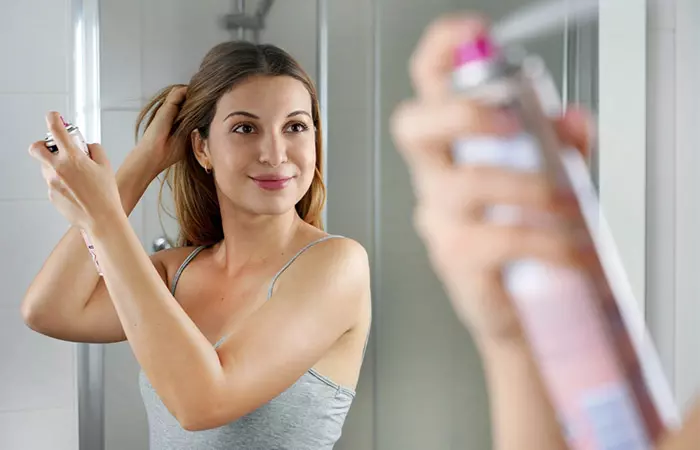
Too much of a good thing can become a bad thing, and that includes hair color. No matter what hair color techniques you use, coloring your hair too often can cause damage, so don’t do it more than once every five to six weeks. Yes, hair color fades over time, but you need to know how to refresh hair color properly to avoid overdoing it and permanently damaging your hair. When your roots begin to show, there is a variety of hair color products on the market, which will help you get through until the next coloring. At-home touch-up kits, hair mascara, and spray-on root concealers can all help get rid of this zipper (grown-out roots around your parting look like a zipper) and hide grays between hair-color treatments.
16. Don’t Double-Process Color-Treated Hair
Again, dont overdo the chemicals on your hair. If you color your hair, try to avoid permingi A chemical treatment that permanently changes the hair follicles to create curls in hair or straighten it. or relaxing it simultaneously. If you want to do both, stagger the treatments, and be sure to ask your stylist for low-ammonia, botanical formulas that condition your hair while processing it.
17. If Your Hair is Damaged, Don’t Skip Regular Trims
If you have not been trimming your hair every 6-8 weeks, it is time you started doing so. The best hair color ideas will fall flat if your haircut grows out shabbily or frizzy ends dull the color. Since your hair is much more prone to damage after coloring, regular trims become crucial for maintaining hair health and preventing the spread of damage. This will also help prevent split ends and breakage. If your dyed locks are frizzy, your hair may be damaged. The best way to keep your color-treated hair looking its healthiest is to get regular cuts or trims. You don’t have to get a super short cut just trim it enough to keep frayed ends at bay.
Hair dyes and the hair care industry is expected to experience a boom in the following years. The global market for hair color generated a revenue of 21.4 billion dollars in 2025, and it is anticipated that this market will increase to roughly 36.2 billion dollars by 2027.

Market Value Of Hair Color Worldwide In 2025 And 2027
Source: Hair color/dye market in the U.S. - Statistics & FactsOne of the popular questions among beginners is how long a hair dye lasts. Read on to know the answer if you too are curious.
Key Takeaways
- Freshly colored hair should not be washed for at least 72 hours after coloring as it is prone to damage and fading.
- Use color-safe products to maintain the color and ensure it does not fade quickly.
- Consuming vitamin-rich foods will help maintain the strength and shine of your colored hair.
- Use hair products with UV protection to maintain the vibrance of your hair color.
How Long Does Hair Dye Last?
The longevity of hair dye can vary based on several factors, such as the type of dye used, hair care practices, and the rate of hair growth. Semi-permanent dyes typically last for about 4-6 weeks, gradually fading with each wash. Permanent dyes can last until new hair growth occurs, often up to 6-8 weeks. However, the vibrancy may reduce over time, and exposure to sunlight, heat styling, and harsh hair products can expedite fading. Frequent shampooing also shortens the color’s lifespan. Remember, vibrant or unconventional colors may fade more quickly than natural shades. To extend the life of your dyed hair, be mindful of these factors, although there are no foolproof ways to determine exactly how long your specific dye job will last.
Dyeing your hair at home can be convenient, but people often make some common mistakes. Knowing these can help you achieve better results and protect your hair from damage.
Mistakes To Avoid When Dyeing Hair At Home
Here are some common mistakes people make when dyeing their hair at home:
- Skipping a patch test can lead to allergic reactions or irritation. Therefore, always test the product on a small part of your skin before applying it to your hair.
- Choosing the wrong shade might result in unexpected color outcomes. Colors that are too dark might make your face appear reddish/pinkish, while light colors might wash you out. Therefore, ensure you choose a color that flatters your skin tone and undertone.
- Not following the dye instructions may leave you with patchy and uneven results. Read the instructions carefully and use the right tools for color application.
- Leaving the dye on for too long can dry out your hair. Always check the package instructions and stick to the time specified on that.
- Using too little dye can leave parts of your hair untouched. So, ensure you use an adequate amount of dye for your hair length.
Infographic: Things To Know Before You Color Your Hair
If you want your colored hair to look great, you need to follow a few hair care tips even before you color it. To ensure your hair is in good shape before dyeing, you need to moisturize it and keep the natural oils in it intact to help protect the strands.
Check out the infographic below for some tips that will help you color your hair at home without damaging your delicate tresses.
Some thing wrong with infographic shortcode. please verify shortcode syntax
Color-treated hair demands attention. Nothing is more frustrating than paying a lot of money at your beauty parlor for the latest fashionable color, only to have it fade within a week due to poor hair care. And, if you are having trouble maintaining your mane, don’t worry; we have included some helpful tips for keeping your colored tresses healthy at home. Follow the tips, and your hair color can stay vibrant for a long time with proper maintenance, and your mane can stay as healthy and stunning as ever.
Frequently Asked Questions
Can you professionally dye hair at home?
You can dye your hair like a professional at home if you follow the instructions for the products you are using.
Do you wet your hair before dying it?
Most dyes are not formulated to be used on wet hair. However, if you want a subtle shade, you may wet your hair before dying it. It is always good to follow the directions on the product.
Which hair dye is the least damaging?
Semi-permanent dyes are less damaging than permanent dyes.
Is store-bought hair color as good as that in a salon?
No. Salon hair dyes are better than store-bought dyes.
How long does hair dye last?
Hair dye typically lasts 4-6 weeks, depending on factors like hair type, dye quality, and aftercare.
Illustration: Tips To Take Care Of Colored Hair At Home
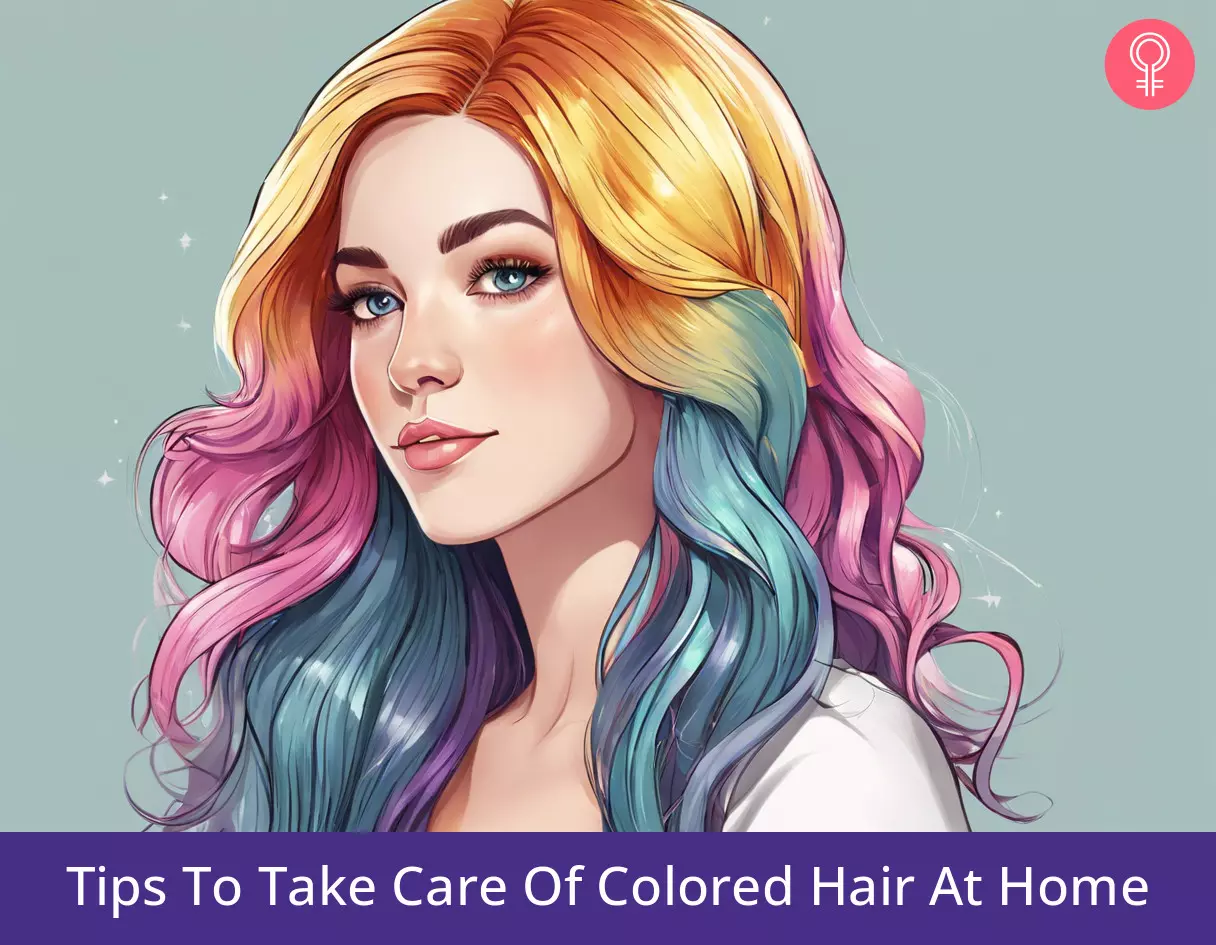
Image: Stable Diffusion/StyleCraze Design Team
Discover essential hair care tips for maintaining silky, smooth, and shiny colored hair right at home. Unveil expert advice to keep your locks vibrant and healthy. Elevate your hair care routine now!
Personal Experience: Source
StyleCraze's articles are interwoven with authentic personal narratives that provide depth and resonance to our content. Below are the sources of the personal accounts referenced in this article.
i. My Experience: Dyeing and Maintaining Black Hairhttps://theeverydayalternative.wordpress.com/2018/02/27/my-experience-dyeing-and-maintaining-black-hair/
References
Articles on StyleCraze are backed by verified information from peer-reviewed and academic research papers, reputed organizations, research institutions, and medical associations to ensure accuracy and relevance. Read our editorial policy to learn more.
- Hair Cosmetics: An Overview ,
https://www.ncbi.nlm.nih.gov/pmc/articles/PMC4387693/ - Egg, whole, raw, fresh, FoodData Central, U.S. Department of Agriculture.,
https://fdc.nal.usda.gov/fdc-app.html#/food-details/171287/nutrients%20 - Vitamin C,
https://medlineplus.gov/ency/article/002404.htm - Hair-discoloration of Japanese elite swimmers,
https://pubmed.ncbi.nlm.nih.gov/11092265/
Read full bio of Dr. Jyoti Gupta
Read full bio of Annie Jangam
Read full bio of Eshna Das
Read full bio of Monomita Chakraborty







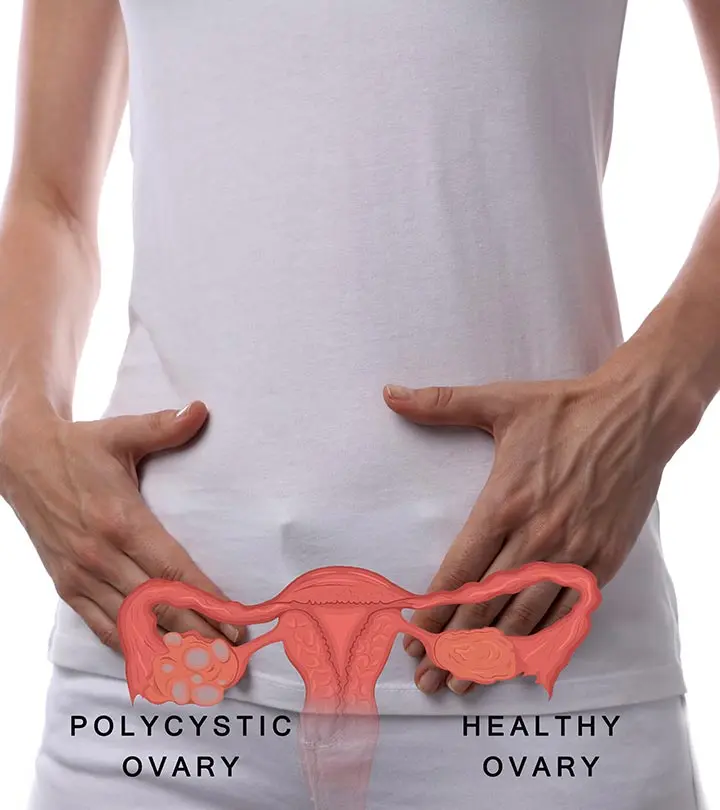
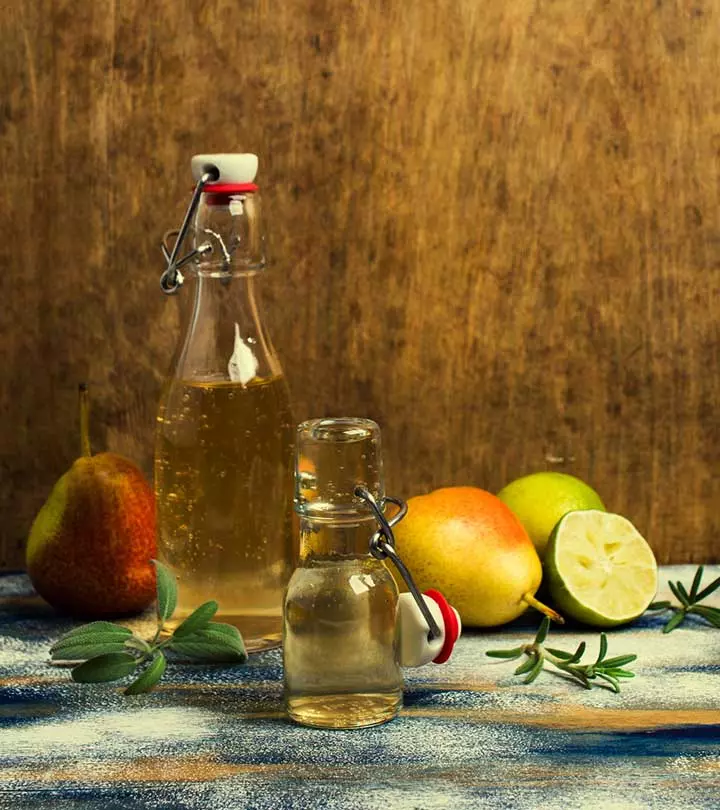
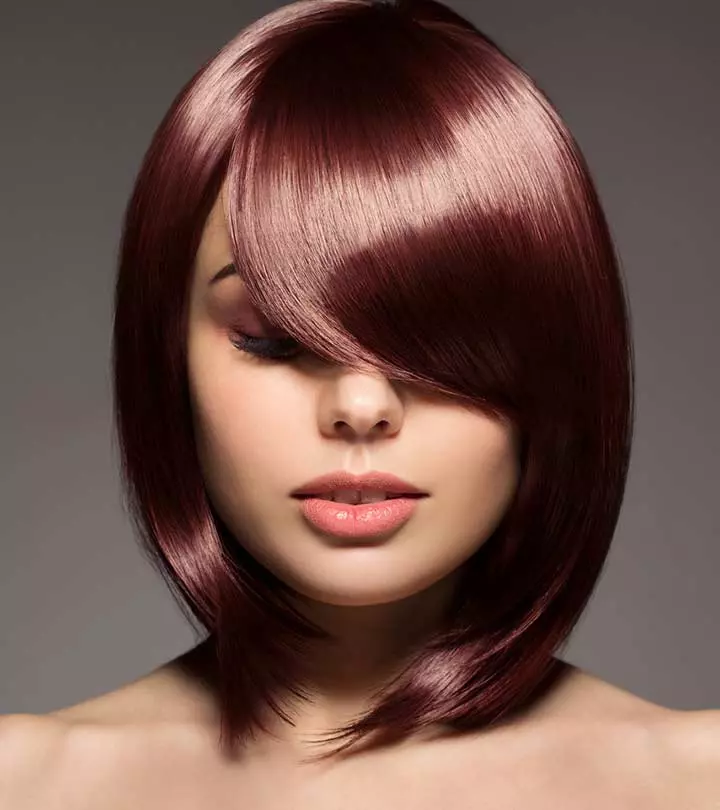
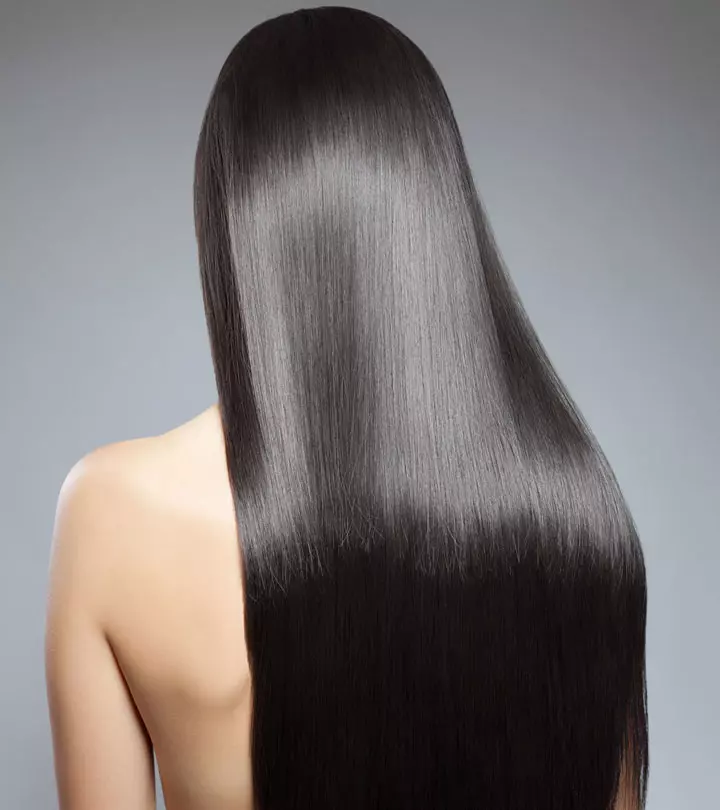
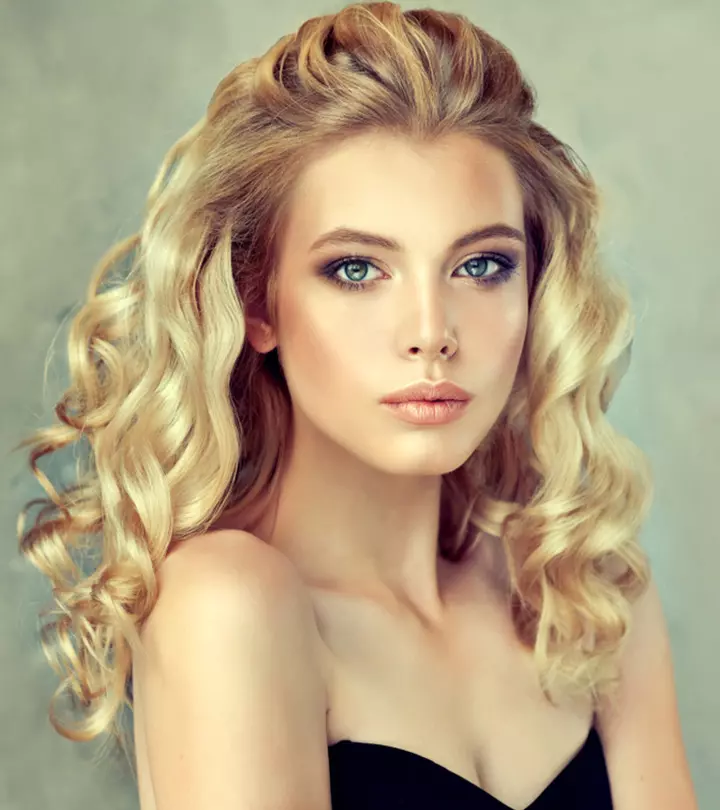
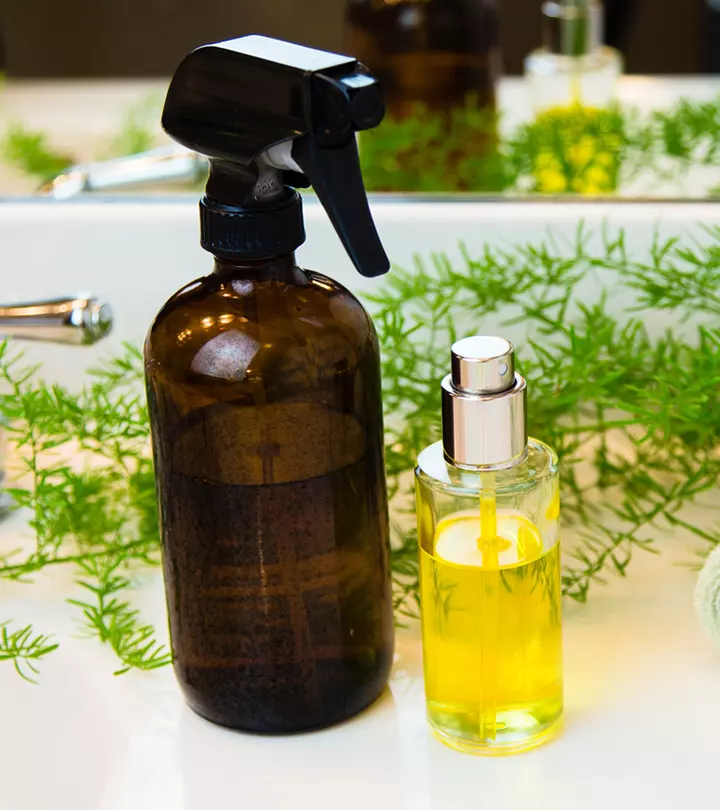
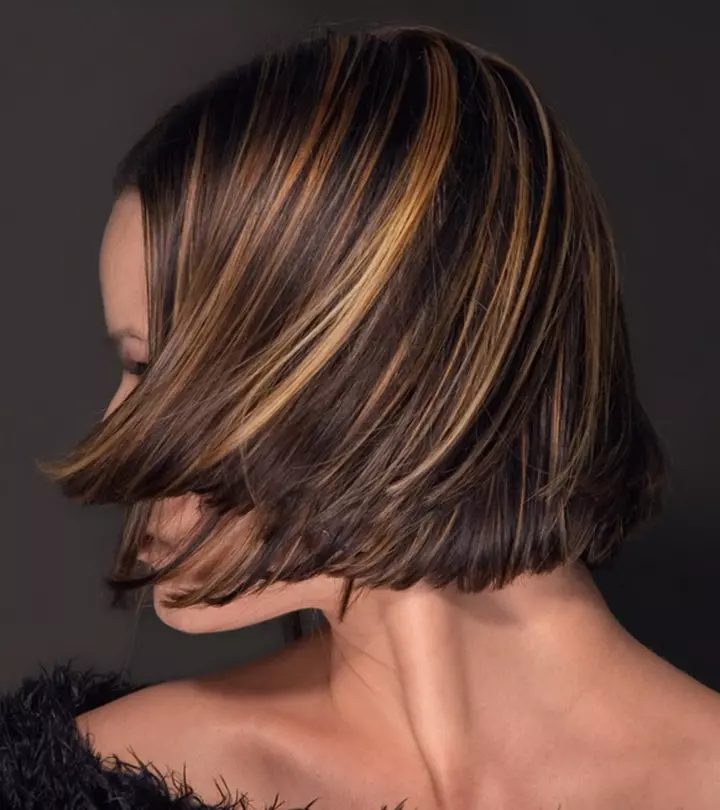
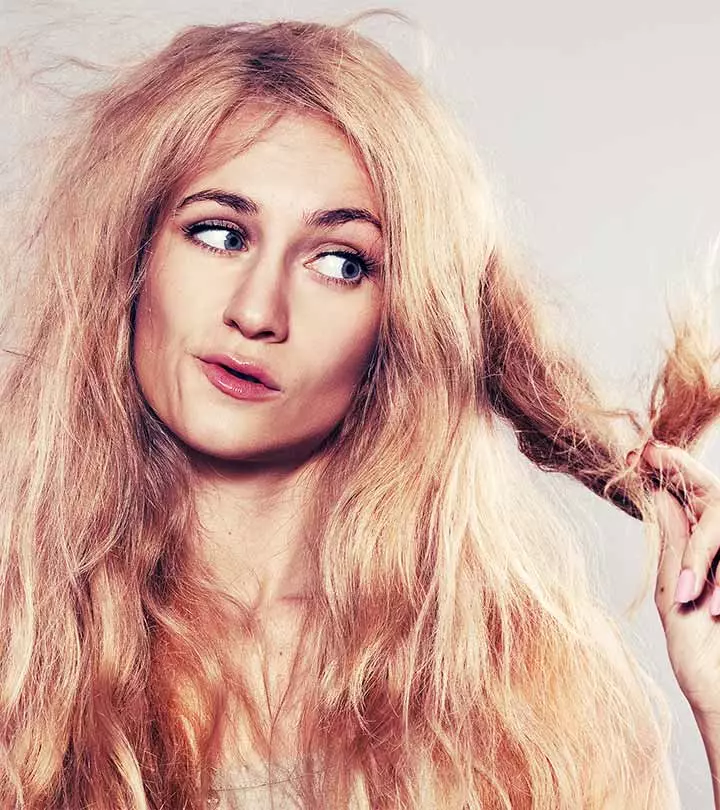
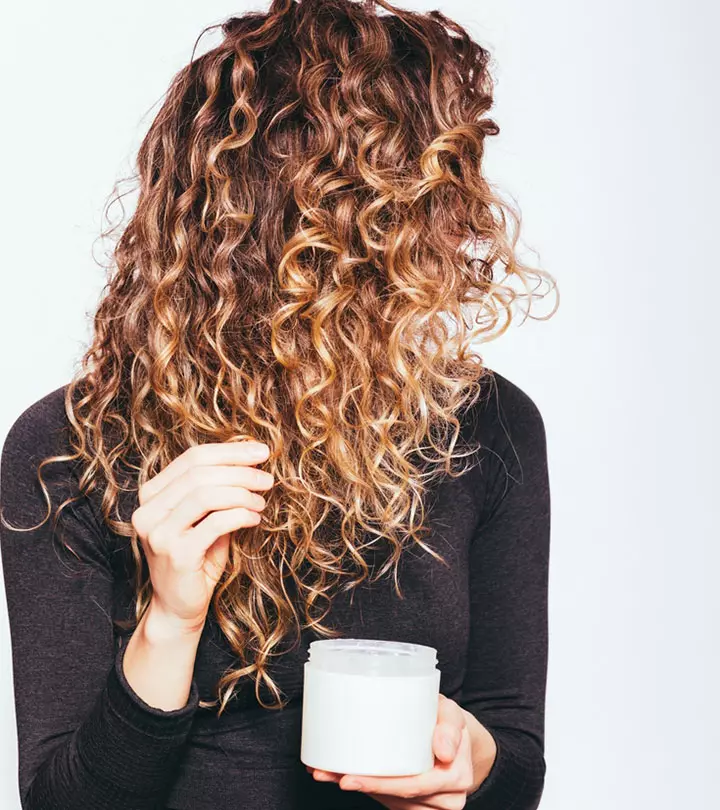
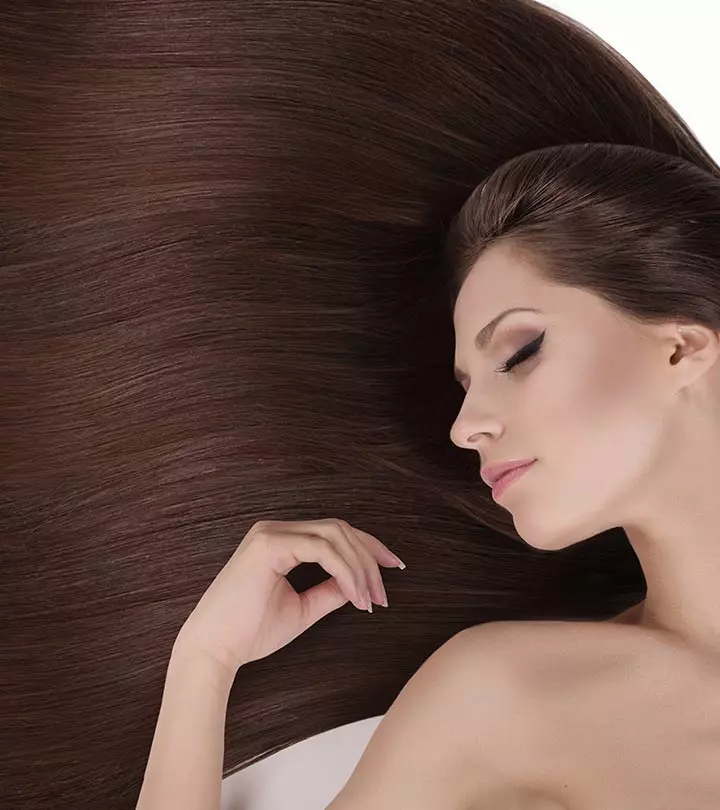
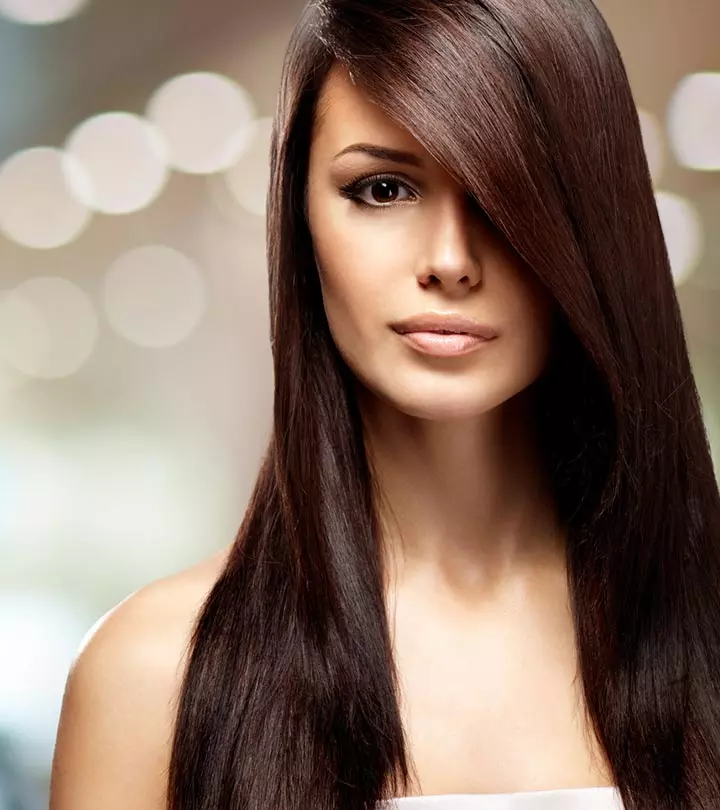
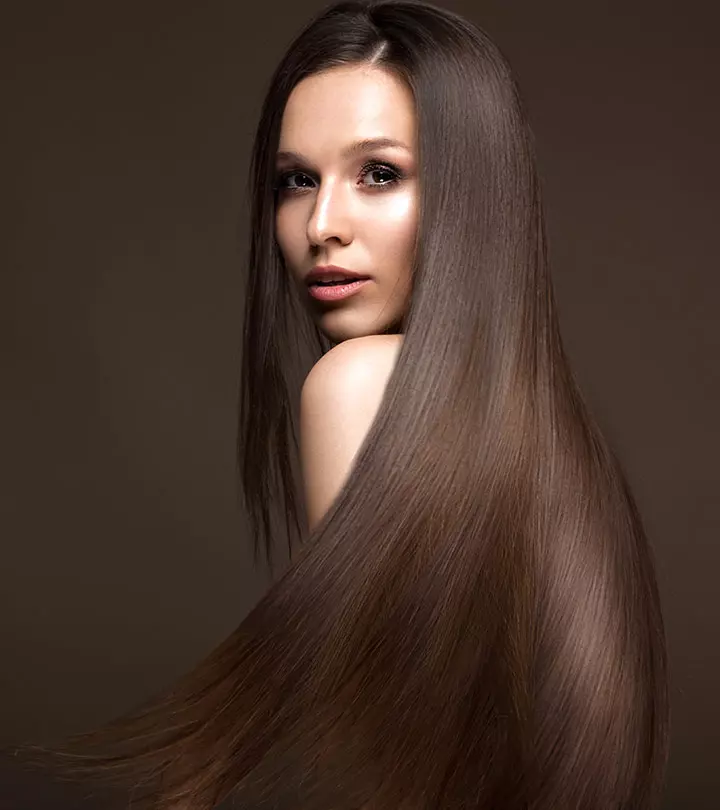
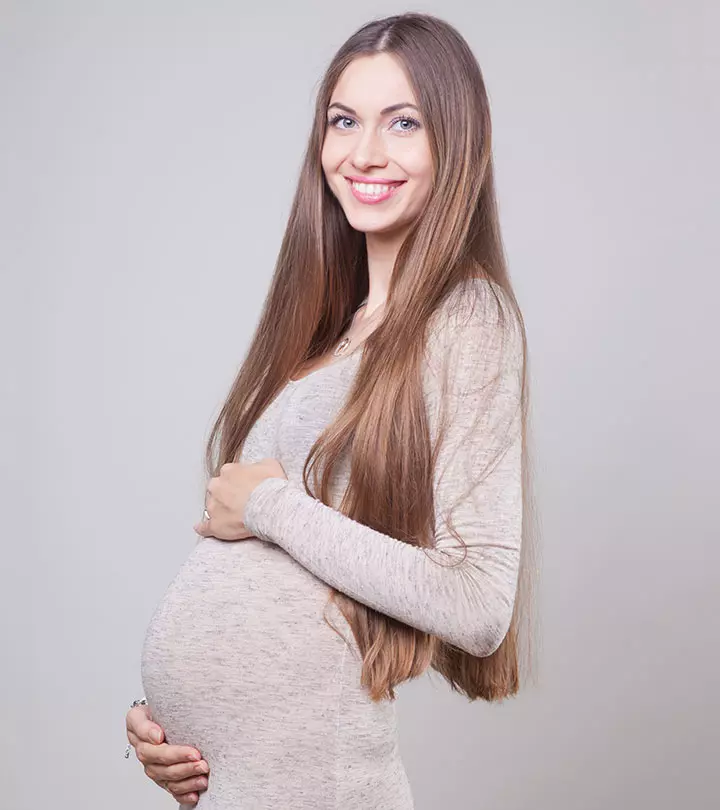
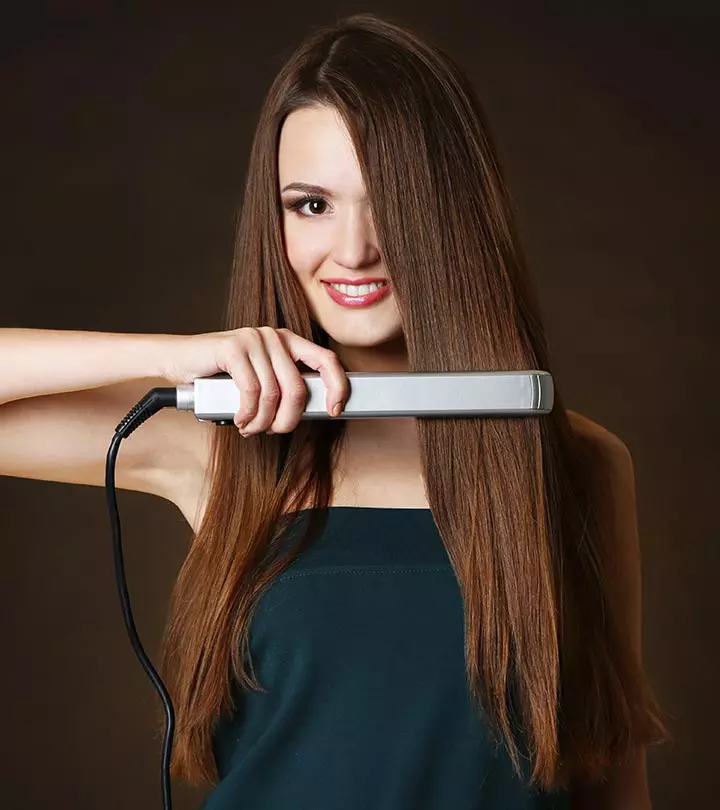
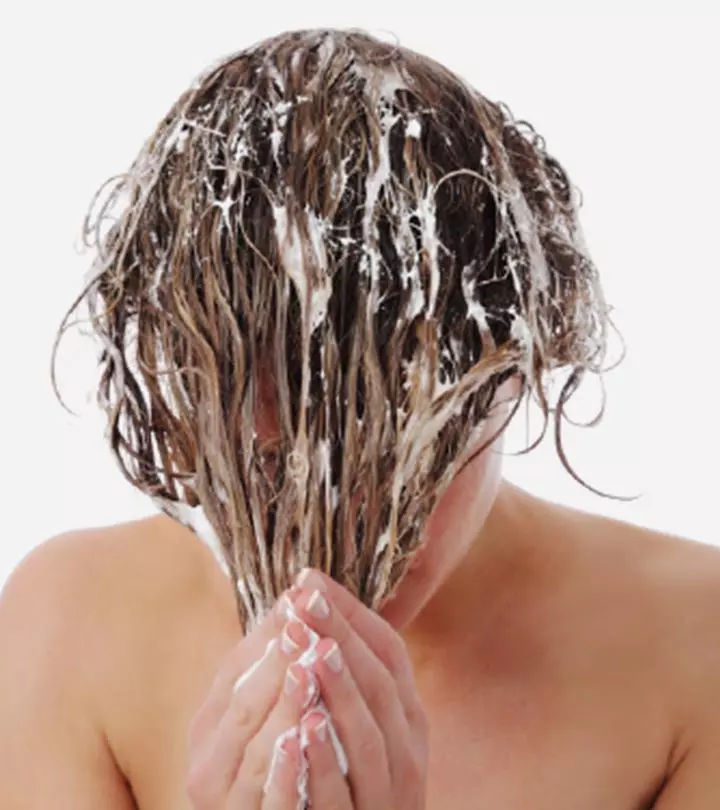
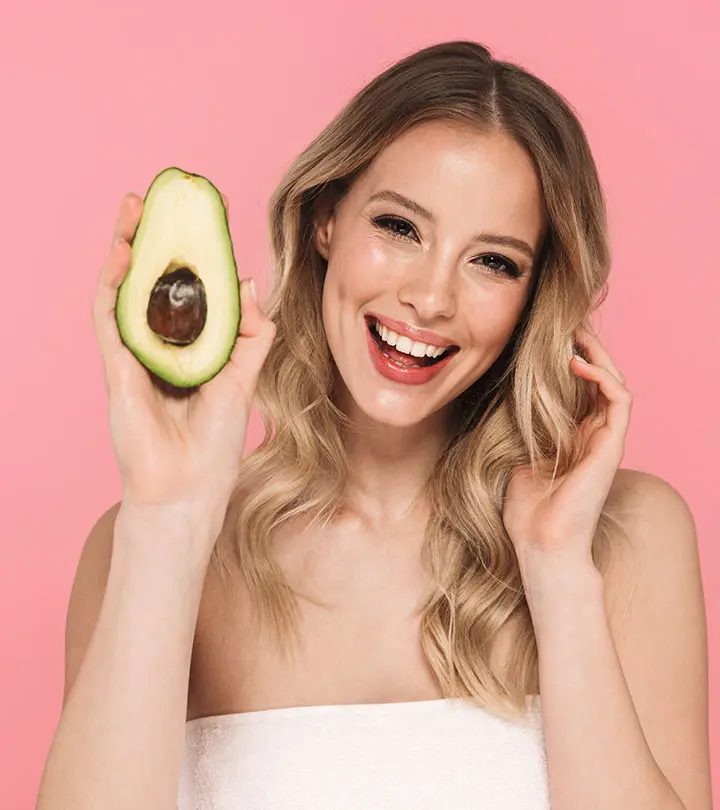

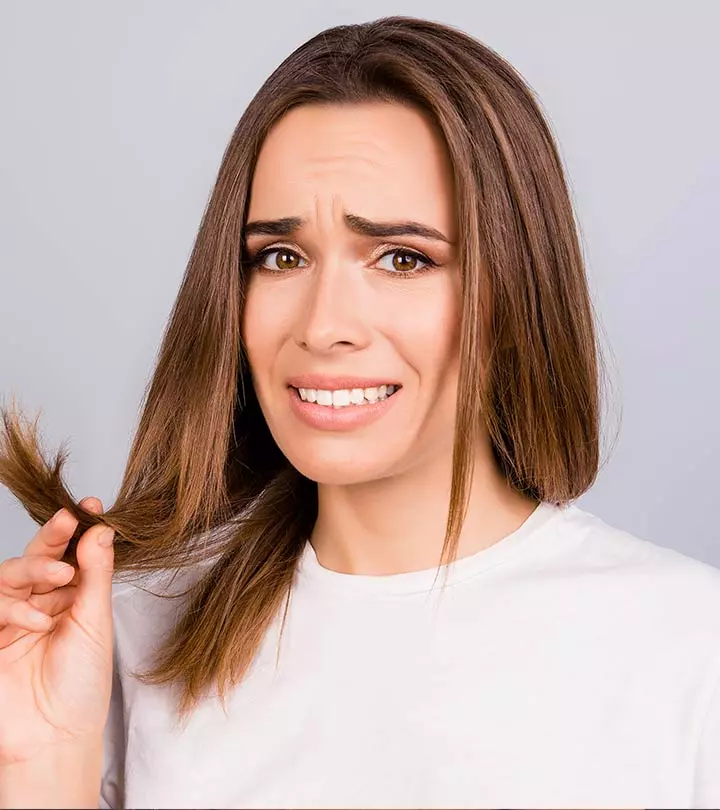

Community Experiences
Join the conversation and become a part of our empowering community! Share your stories, experiences, and insights to connect with other beauty, lifestyle, and health enthusiasts.